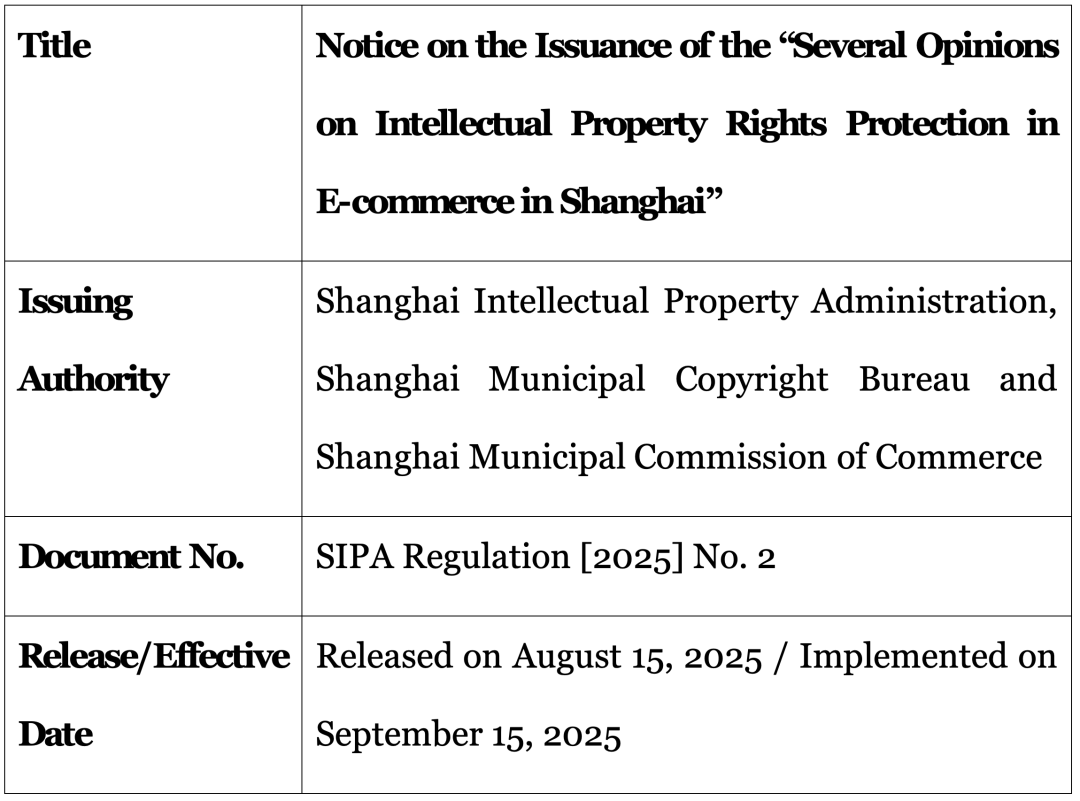Shanghai Weekly Bulletin (Issue 109 No.1, September 2025) ( 2025.09.03 )

Laws and Regulations
National
1. General Offices of the CPC Central Committee and State Council Issue Guidelines to Strengthen Development of the National Carbon Market
[Keywords: Carbon market]
Recently, the Opinions of the General Office of the CPC Central Committee and the General Office of the State Council on Advancing Green and Low-carbon Transformation and Strengthening the Development of the National Carbon Market was released. The document calls for accelerating the establishment of a nationwide carbon emissions trading market, actively developing a national trading market for voluntary greenhouse gas emission reduction, enhancing the vitality of the carbon market, and comprehensively strengthening institutional and capacity building for the carbon market.
Source: International Services Shanghai
https://english.shanghai.gov.cn/en-Latest-WhatsNew/20250826/33c485b3408e4052b90ccd2c28a7a87f.html
2. State Council Issues Guidelines to Deepen Implementation of the “AI Plus” Initiative
[Keywords: AI Plus]
The State Council recently released the Opinions on Deepening the Implementation of the “AI Plus” Initiative, setting out six priority actions and eight foundational capabilities to be strengthened. By 2027, China aims to achieve extensive and deep integration of AI in six key sectors, with the penetration rate of next-generation smart terminals and AI agents exceeding 70%. The core industries of the intelligent economy are expected to expand rapidly, AI’s role in public governance will be significantly enhanced, and the framework for open cooperation in AI will become more robust. By 2030, AI is expected to fully empower high-quality development, with the adoption rate of next-generation smart terminals and intelligent agents surpassing 90%. The intelligent economy will become a major growth driver of China’s economic development, advancing inclusive technology benefits and shared outcomes. By 2035, China aims to fully enter a new stage of intelligent economy and intelligent society, providing strong support for the fundamental realization of socialist modernization.
Source: Chinese Government Website
https://www.gov.cn/zhengce/content/202508/content_7037861.htm
3. People’s Bank of China and Reserve Bank of New Zealand Renew Bilateral Currency Swap Agreement
[Keywords: New Zealand]
The People’s Bank of China (PBC) and the Reserve Bank of New Zealand have recently renewed their bilateral currency swap agreement. The swap line is set at RMB 25 billion, with a validity period of five years, and may be extended upon mutual agreement.
Source: PBC
http://www.pbc.gov.cn/goutongjiaoliu/113456/113469/5821227/index.html
Shanghai
1. Shanghai Releases Implementation Plan for “One-stop Service” in the Commercialization of Sci-Tech Achievements
[Keywords: Sci-tech achievements, Commercialization]
Recently, the Shanghai Municipal Science and Technology Commission (STCSM), together with three other government departments, issued the Implementation Plan for “One-stop Service” in the Commercialization of Sci-Tech Achievements. The document proposes to integrate key matters such as the recognition of high-tech achievement commercialization projects, applications for dedicated funding, applications for special funds for intellectual property, and the certification and registration of technology contracts into a single “one-stop” service package, and establish an “all-in-one” service window for streamlined processing.
Source: Shanghai Sci-tech
2.Lingang Special Area Issues Plan for Building an International Data Processing Hub
[Keywords: Data processing]
Recently, the Lingang Special Area Administration, together with three other authorities, issued the Plan for Building an International Data Processing Hub in the China (Shanghai) Pilot Free Trade Zone Lingang Special Area. The document sets out measures such as deepening alignment with international data rules and industrial cooperation, improving the innovative management system for the data processing hub, fostering diverse international data service models, strengthening the foundation of international data service infrastructure, and creating a high-quality development ecosystem for international data services.
Source: Shanghai Commerce
Regulations Entering into Force


Q&A
At the press conference series on the achievements of Shanghai’s 14th Five-Year Plan, titled “Delivering Results Through Action, Carrying Forward a New Blueprint”, relevant officials from the Shanghai Huangpu District Commerce Commission responded to a reporter’s question:
Q
“Huangpu has a distinctly outward-oriented economy. During the 14th Five-Year Plan period, what has been the specific situation of foreign-funded businesses in the district? What concrete measures have been taken to attract foreign investment and enhance the district’s appeal and competitiveness?”
A
Since the start of the 14th Five-Year Plan, Huangpu District has seized new opportunities arising from high-standard opening-up, comprehensively optimized the foreign investment environment, focused on improving services for foreign investors, and continuously enhanced the district’s attractiveness and competitiveness.
From a quantitative perspective, Huangpu District is home to nearly 3,000 foreign-funded enterprises with independent legal person status, with investment sources spanning over 70 countries and regions worldwide. The district also hosts multiple foreign consulates in Shanghai and a wide range of international chambers of commerce and trade associations. From a quality perspective, Huangpu District has ranked first in Shanghai for three consecutive years in the proportion of profitable foreign-funded enterprises, and second citywide for three consecutive years in the number of enterprises listed among Shanghai’s Top 100 foreign-funded enterprises. From a capacity perspective, foreign-funded enterprises consistently contribute over 40% to Huangpu’s economy. The number of regional headquarters of multinational companies (MNCs) has grown from 53 at the end of 2020 to 83 at present, while the number of R&D centers has risen from 2 to 8 over the same period. We have advanced foreign investment work mainly in three areas:
First, we remain committed to expanding opening-up and enhancing the capacity of Huangpu’s outward-oriented economy. We have actively developed high-standard, wide-reaching functional open platforms, advancing the establishment of the first batch of Collaborative Innovation Zones of the China (Shanghai) Pilot Free Trade Zone and the Huaihai Xintiandi Import Trade Promotion and Innovation Demonstration Zone. Leveraging urban renewal opportunities, we have released premium space resources in prime areas such as Xintiandi, providing foreign investors with broad development platforms and high-quality urban amenities. This year, we launched the Shanghai International Jewelry Fashion Functional Zone in the “Greater Yuyuan Area” and conducted dedicated roadshows both domestically and overseas to attract deeper foreign investment participation in the development of key functional zones. On the policy side, during the 14th Five-Year Plan period, we have released new foreign investment policies annually, including targeted measures to support regional headquarters of MNCs, foreign-funded R&D centers, and trade-oriented headquarters. In 2024, we pioneered Shanghai’s first policy supporting equity investment by MNCs.
Second, we have strengthened internal–external coordination and improved the promotion and service mechanisms for foreign investment. As early as 2021, we established the District Task Force for Foreign Investment Promotion, bringing together 46 governmental departments to jointly advance related work. By 2024, we have further optimized the overall coordination mechanism for foreign investment, achieving efficient cross-departmental collaboration in areas such as information sharing, project follow-up, and enterprise services. We have continued to expand our global investment promotion network, establishing strategic “cornerstone” partnerships with 14 institutions including the Shanghai Foreign Investment Association and the German Chamber of Commerce, and, with the support of our partners, introduced a number of foreign investment projects. In terms of foreign investment brand events, we have hosted the Foreign Investment Promotion Conference for four consecutive years and released a multilingual edition of the White Paper on the Foreign Investment Environment. In addition, we have innovatively launched the “Meet Huangpu Online” investment promotion platform, carrying out regular promotional activities targeting key countries such as Germany and Italy, and enabling precise investment promotion without the need to go abroad.
Third, we continue to benchmark against top international standards and optimize the ecosystem for foreign investment. In terms of legal support, we established Shanghai’s first International Commercial Circuit Court Station, dedicated to handling foreign-related civil and commercial cases. We have also introduced the Foreign-related Legal Services Handbook and a White Paper, while strengthening corporate compliance guidance. On the service front, we make full use of a three-tier roundtable mechanism, where district leaders and government departments engage directly with enterprises to respond to their needs. To address the intellectual property rights concerns commonly raised by foreign-funded enterprises, we have work jointly with the district market supervision authorities to promote policies and provide practical guidance on trademark protection and trade secrets. We have also created distinctive service brands for foreign-funded enterprises. Through the “SUPER-HUB” integrated resource platform, we have organized a series of industry salons, fostering cross-sector collaboration between foreign-funded enterprises and leading domestic enterprises across various industries, thereby expanding networks and opening new business opportunities. In addition, we have built ESG featured brands of foreign-funded enterprises. For three consecutive years, we have collected ESG best practices, established a Sustainable Transformation Action Community, and encouraged foreign investors to actively participate in building a robust ESG ecosystem.
Openness is a defining feature of Huangpu and an intrinsic source of vitality for the district. Looking ahead, we will continue to refine our mechanisms and enhance our services, striving to contribute more “Huangpu strength” to the high-quality development of foreign investment in both Shanghai and the nation as a whole.
Source: Shanghai Release
Expert Perspective
Perseverance Yields Results: A Comprehensive Review and Outlook on the “Measures for the Authorized Operation of Public Data Resources in Shanghai”
By Wan Bo (Boss & Young Law Firm)
The Measures for the Authorized Operation of Public Data Resources in Shanghai (hereinafter the “Measures”), issued in July 2025, represent an important institutional innovation in Shanghai’s reform of the market-based allocation of data as a factor of production. This article seeks to propose optimization approaches — focusing particularly on scenario-driven implementation and rapid institutional iteration — with a view to contributing insights for the further improvement of China’s public data authorization and operation framework.
I. Legislative Background and Significance of the Measures
The Measures, officially promulgated in July 2025, mark a critical step forward in Shanghai’s reform of the market-based allocation of public data as a production factor. This legislative initiative is by no means accidental; rather, it reflects profound historical context and pressing practical needs. As the digital economy emerges as a new engine of global growth, the value of data as a novel factor of production has become increasingly prominent. China’s “Twenty Data Policy Measures” explicitly call for the establishment of a property rights framework separating data ownership rights, data processing and usage rights, and data product management rights. Furthermore, the successive release of the “1+4” policy framework by the General Offices of the CPC Central Committee and the State Council, the National Data Administration, and the National Development and Reform Commission has provided clear direction for development of the market-based allocation of public data as a production factor.
Against this backdrop, Shanghai has finally rolled out its long-awaited institutional framework for the authorized operation of public data, a move of pioneering significance.
From the perspective of legislative necessity, the authorized operation of public data faces multiple challenges. On the one hand, public data is authoritative, foundational, and inherently public, carrying immense economic and social value. On the other hand, because it touches on national security, public interests, and personal information, its development and utilization must remain secure and controllable. Although various local pilot programs have accumulated some experience, the absence of unified standards has dampened market participants’ enthusiasm and hindered the full realization of data’s value. The introduction of the Measures is intended precisely to address these issues.
From the perspective of legislative positioning, the Measures were issued by the General Office of the Shanghai Municipal People’s Government upon the approval of the Municipal Government, and fall within the category of normative documents of local government. Their higher-level legal basis includes the Data Security Law, the Personal Information Protection Law, and the Shanghai Data Regulations, among other laws and regulations. As a piece of local legislation specifically regulating the authorized operation of public data, the Measures, under the fundamental principle of “balancing development and security”, establish a relatively comprehensive institutional framework. This framework spans multiple dimensions, including authorization management, data infrastructure, data supply, operational management, development management, and security compliance.
It is noteworthy that the Measures does not exist in isolation but rather operates in synergy with other data policies in Shanghai. For example, in July 2025, the Shanghai Data Bureau issued the 2025 Shanghai Public Data Opening Work Plan, which focuses on promoting data openness in eight key sectors including transportation, education, and healthcare. Together with the Measures, this creates a “openness + authorization” dual-driving model, reflecting a differentiated and category-based approach to data governance.
[To be Continued]
One Week in Shanghai
Latest News
1.2024 Shanghai Science and Technology Awards Announced
[Keywords: Shanghai Science and Technology Award]
The Shanghai Science and Technology Awards Ceremony was recently held to honor scientists and researchers who have made outstanding contributions to Shanghai’s scientific and technological development. A total of 206 projects and individuals received awards in 2024. Three foreign experts — Otto Heinrich Herzog, Billie F. Spencer Jr., and Carola G. Vinuesa — were presented with the International Science and Technology Cooperation Award.
Source: Shanghai Release
2. Bund FTC Official Mini Program Officially Launched
[Keyword: FTC]
Recently, the official Bund mini program “FTC+1” was launched as an important digital platform supporting Huangpu District’s efforts to build a hub for premium online content creation. The platform deeply integrates Bund FTC’s offline space resources with its online service ecosystem, offering ten core functional modules for resident organizations and individual creators, and serving as a “digital steward”.
Source: Shanghai Huangpu
Corporate Activities
1. SAIC Audi Smart Manufacturing Base Officially Put into Operation
[Keyword: Audi]
Recently, the SAIC Audi Smart Manufacturing Base was officially completed and put into operation. As the latest achievement of Sino-German industrial cooperation, the base seamlessly integrates Audi’s century-old German precision engineering with China’s advanced digital intelligent manufacturing systems. With a planned annual capacity of up to 360,000 vehicles, the facility further enhances the capabilities of China’s high-end automobile manufacturing sector.
Source: Shanghai Jiading
Competitive Event
1. China Innovation and Entrepreneurship Competition (Special Session for Aviation) and the 3rd “Large Aircraft” Innovation and Entrepreneurship Competition Kicks Off
[Keywords: China Innovation and Entrepreneurship Competition]

The 14th China Innovation and Entrepreneurship Competition (Special Session for Aviation), together with the 3rd “Large Aircraft” Innovation and Entrepreneurship Competition, officially launched in August. Under the theme “Together for Innovation, Advancing into the Future”, this year’s competition focuses on seven key areas: intelligent design, smart aircraft, flight testing, advanced manufacturing, new materials and processes, intelligent operation and maintenance services, and green aircraft. Registration is open until early October 2025.
Source: Lingang Special Area Large Aircraft Aviation Industrial Park
Culture & Art
1. “Shanghai Modern” Grand Exhibition Opens
[Keywords: Art exhibition]

On August 28, the China Art Museum, Shanghai, unveiled its landmark annual exhibition, “Shanghai Modern”. Through three thematic sections — “Romance in Red”, “Everyday Life in the Metropolis”, and “New Trends in Shanghai Culture” — the exhibition offers a detailed narrative of Shanghai’s cultural transformations since the 20th century. Featuring more than 600 works across diverse media — including woodcuts, posters, architecture, design, oil painting, traditional Chinese painting, photography, film, comics, and music — the exhibition provides a comprehensive exploration of the city’s modern DNA and the cultural code through which its people have shaped history.
Source: China Art Museum, Shanghai
Training
1. Registration Opens for Corporate Supply Chain Emission Reduction Training
[Keywords: Supply chain, Emission reduction]
The Green and Low-carbon Development Branch of the Shanghai Foreign Investment Association, together with the Environmental Defense Fund (EDF), will host a corporate supply chain emission reduction training session on September 10. Through methodology introductions and case studies, the training aims to help companies build supply chain action plans that are both scientifically sound and operationally practical, enabling them to strengthen supply chain advantages and achieve sustainable development amid the green transition.